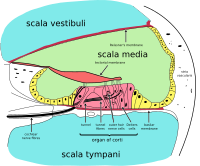
Photo from wikipedia
Hearing impairment affects 1 in 500 newborns worldwide and nearly one out of three people over the age of 65 (WHO, 2019). Hereditary hearing loss is the most common type… Click to show full abstract
Hearing impairment affects 1 in 500 newborns worldwide and nearly one out of three people over the age of 65 (WHO, 2019). Hereditary hearing loss is the most common type of congenital deafness; genetic factors also affect deafness susceptibility. Gene therapies may preserve or restore natural sound perception, and have rescued deafness in multiple hereditary murine models. CRISPR-Cas9 and base editors (BEs) are newly developed gene-editing technologies that can facilitate gene studies in the inner ear and provide therapeutic approaches for hearing impairment. Here, we present recent applications of gene editing in the inner ear.
Journal Title: Neuroscience Letters
Year Published: 2019
Link to full text (if available)
Share on Social Media: Sign Up to like & get
recommendations!